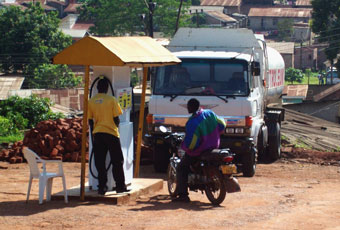
By Joan Akello
Shell exit
They are small operators, without depots. Some are a single, stand alone service station while others belong to a group. They are called “small independents” because unlike the big oil companies like Shell or Total, they answer to nobody.
Since Shell announced it was divesting its service station business in Uganda and 20 other African countries, the independents have come under greater scrutiny. Will the exit of Shell be an opportunity for the independents to expand? Do they have that capacity?
Shell’s exit follows that of Agip and Caltex (chevron) which were bought by Shell and Total respectively. Engen, Kobil and Gapco have emerged behind them as companies with significant market shares. Theentry of many more players has increased the number of oil companies in Uganda, big and small, to about 87 currently. Most are small operators who were attracted by the super normal profits the traditional big companies were enjoying. Before 2003, there were less than 26 petroleum companies in Uganda.
Optimists like Rev. Frank Tukwasibwe, the Acting Commissioner for Petroleum Supplies in the minister of Energy told The Independent that shell’s exit will have no impact and will not create a void.
“The buyer will take over the business and there will be continuity in the business,” he said. Commenting on the independents he said: “Ask them why they have failed to grow and whether their licenses restrain them from growing and expanding.”
The pessimists, however, are anxious that the big petroleum companies are leaving Uganda. Uganda is prone to spikes in scarcity of oil products. Without national oil reserves, it has relied on the big companies that have more infrastructure and international supply chains to ensure reasonably steady and reliable supply, stable pricing, and ability to invest in the oil sector. The pessimists are also are sceptical of price stability .They say the small independents lack regulatory bodies to supervise and check on their pump prices and performance. Their management is thereby wanting..
James Buyungo, branch manager Rio Oil Ltd, New Mulago says that most small operators like him are incapable of expanding. He said, “High license fees and taxes levied puts off would be tax payers”. This has caused the emergence of many petrol hawkers. They have no petrol stations; some even operate in their houses. “This is unfair competition,” said Buyungo, “Rio Oil has been defeated because out of 44 petrol stations only 4 are currently operational,” he said.
Although small operators are flexible in terms of location, including widespread trade operations even in rural areas, they are however unreliable because of limited supply and lack infrastructure like service stations and storage (depots) and unstable prices.
There are protected from the diseconomies of scale that afflict the large scale operations including high taxes and overhead costs resulting from running a big company with big manpower.
They, however, cannot expand due to limited capital especially among local proprietors. This explains why most of them do not have well defined management, storage facilities, and only a few service stations with few pumps.
Mohammed Hussein, who is the Operations Manager of Nationallube Uganda Ltd, says Uganda’s land lockedness, increasing international oil prices and unstable dollar value discourages small operators from expanding in terms of constructing depots. They prefer buying the petroleum products locally to importing.
“Shell has high costs but the smaller companies incur fewer costs. They use less manpower, off load directly to their stations but not from the depot to stations,” he says.
He is optimistic that small oil companies like his can effectively deliver the oil products the economy needs without big players like Shell.
“They have broken the monopoly of Shell and Total,” he says, “This is because Africans are taking over the multinational companies for instance Engen or Oilbya will buy Shell, petro city is run by a Kenyan and Ugandan, City Oil by Somalis, therefore they have the opportunity to open up new stations in rural areas.”
But Jeff Mwaka, Branch Manager of Kobil Kamwokya disagrees. “How can you expand without a depot in Uganda?” he asks.
He says the small companies are unreliable because they lack storage facilities. “What will they do when the ships are delayed at sea or Mombasa port? It is not easy to sustain an economy especially big consumers like the government and telecommunications companies, Aggreko thermal power generation plant, and construction companies; generally customers that require petroleum products in large quantities.” Mwaka says size and service go hand in hand.
Mwaka attributes the failure of small operators to expand to the negative attitude the general public has towards them and their products. He says their products are usually diluted, adulterated, or recycled (lubricants) and measurement is questionable.
Omer .A. Omer, Financial Manager Concorp Petroleum Ltd Kyambogo said his company has no depot and does not see the need for it.
“We buy our products locally,” he says.
He says as long as the Jinja reserves are refurbished and well stocked, the depot is useless. He is sure that Concorp has the capacity to expand citing availability of start up capital, and capable management.
He cites a Sudanese proverb: “When the elephant falls down, the mice and butchers take over” to describe his company’s prospects after Shell’s departure. Many wait to see how the mice and butchers will carry the heavy tusks of the dead elephant.
 The Independent Uganda: You get the Truth we Pay the Price
The Independent Uganda: You get the Truth we Pay the Price


